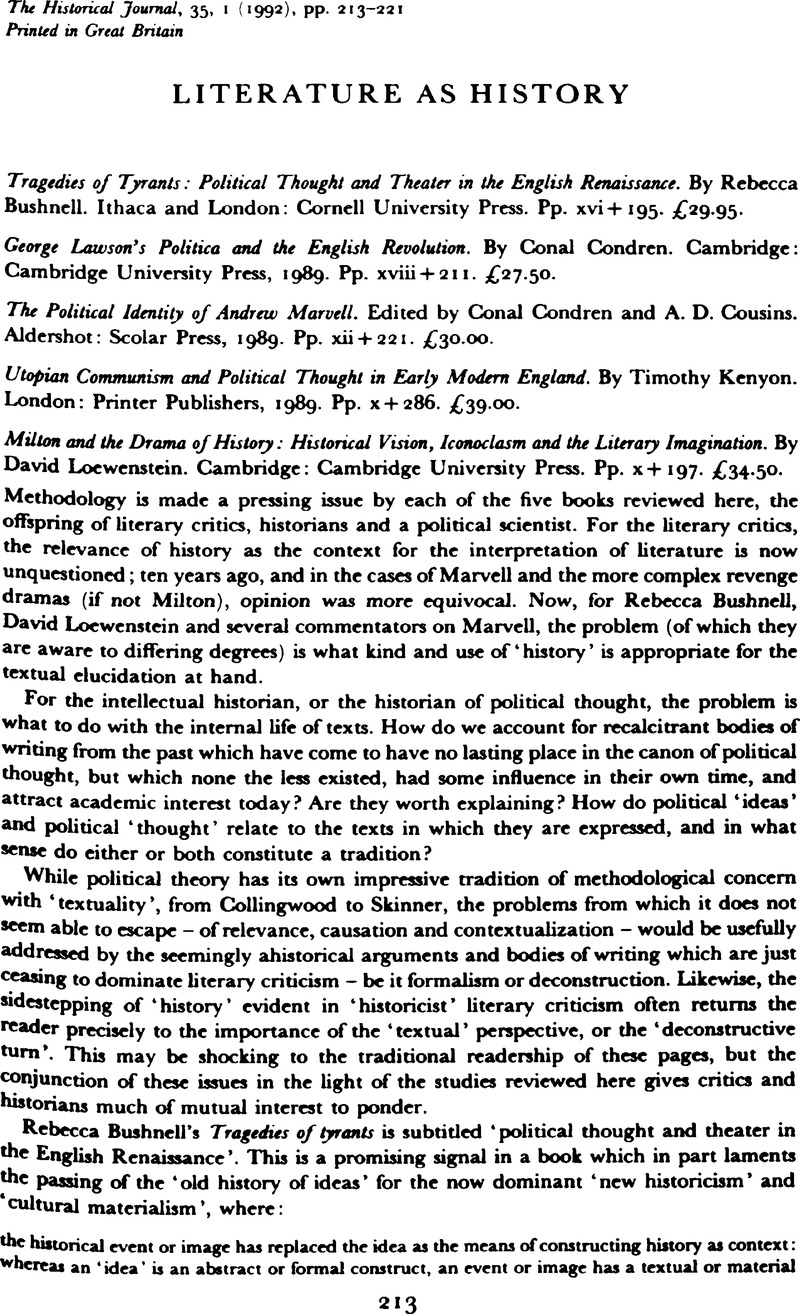No CrossRef data available.
Article contents
Literature as History
Published online by Cambridge University Press: 25 March 2010
Abstract

- Type
- Review Articles
- Information
- Copyright
- Copyright © Cambridge University Press 1992
References
page 215 note 1 Belsey, Catherine, Tkt subject of tragedy: identity and diference in renaissance dram (London, 1985).Google Scholar
page 215 note 2 See, for instance, Tennenhouse, Leonard, Power on display: the politics of Shakespeare's genres (London, 1986)Google Scholar ; MulUney, Steven, The place of the stag: license, play and power m renainawe England (Chicago, 1988)Google Scholar.
page 215 note 3 See Butler, Martin, Theatre and crisis 1632–1642 (Cambridge, 1984)Google Scholar.
page 215 note 4 See also Billington, Sandra, Mock kings in medieval society and renaissance drama (Oxford, 1991).Google Scholar
5 See Kibbey, Ann, The interpretation of material shapes in puritanism: a study of rhetoric, prejudice and violence (Cambridge, 1986).Google Scholar
6 Sterne, Laurence and Kollmeier, Harold H. (eds.), A concordance to the English prose of John Milton (Binghamton, 1985).Google Scholar
7 Dzelzainis, Martin, ‘Milton, Macbeth, and Buchanan’, The Seventeenth Century, IV (1989), 55–6;Google ScholarPotter, Lois, Secret rites and secret writing: royalist literature 1641–1660 (Cambridge, 1989), pp. 162–3, 203Google Scholar.
8 For the most recent and relevant studies, see MacLean, Gerald, Time's witness: historical representation in English poetry, 1603–1660 (Madison, WI, 1990)Google Scholar; Maltzahn, Nicholas von, Milton's history of Britain: rtpublican historiography in tht English revolution (Oxford, 1991)CrossRefGoogle Scholar.
9 See Worden, Blair, ‘Andrew Marvell, Oliver Cromwell and the Horatian ode’, in , Kevin, Sharpc and Zwicker, Steven (eds.), Politics of discourse: the literature and history of seventeenth-century England (Berkeley, 1987). PP. 147–80Google Scholar ; Norbrook, David, ‘Marvell's “Horatian Ode” and the politics of genre’, in Healy, Thomas and Sawday, Jonathan (eds.), Literature and the English Civil War (Cambridge, 1990), pp. 147–69Google Scholar.
10 See Wallace, John M., Destiny his choice: the loyalism of Andrew Marvell (Cambridge, 1968);Google Scholar
11 See Man, Paul de, Allegories of reading (New Haven, 1979), p. 71Google Scholar
12 Skinner, Quentin, ‘Hobbes, Leviathan and rhetoric’, lecture at Keble College, Oxford, April 1990Google Scholar; see also Hill, Christopher, ‘Radical prose in 17th-century England: from Marprclatc to the levellers’, Essays m Criticism, XXXII (1982), 95–118CrossRefGoogle Scholar ; Smith, Nigel, Perfection proclaimed: language and literature in English radical religion, 1640–1660 (Oxford, 1989)Google Scholar.




